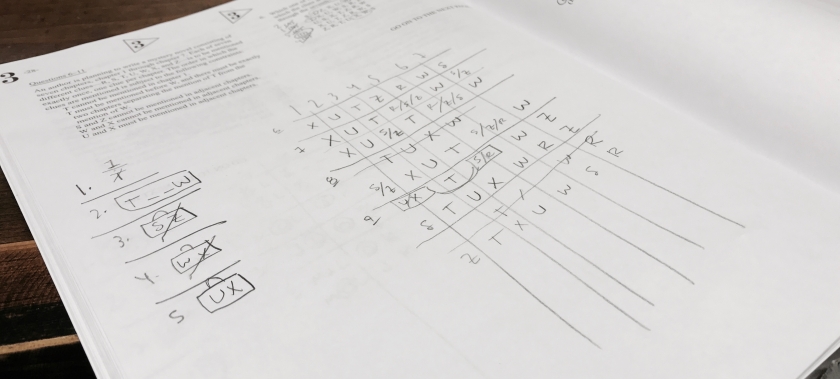 Logic games are the best. If you’re reading this, chances are they’re currently the bane of your existence but hear me out.
Logic games are the best. If you’re reading this, chances are they’re currently the bane of your existence but hear me out.
How, then, do we get to a perfect logic game?
Some cardinal rules:
Read the Power Score Logic Games Bible carefully.
When I say read, I don’t mean skim as you’re half asleep after school or work, forgetting what you just read a second before. I mean intensely read. Read and re-read until you really internalize what they’re telling you. The folks at Power Score have cracked logic games the way that Pythagoras cracked right triangles. Treat their methods as the formula that you just need to know if you want to solve a game. Attacking games willy-nilly on your own—some of your instincts sprinkled here, some suggestions you half-remember from Power Score sprinkled there—is not going to cut it. They’re not light suggestions. Their methods are the arithmetic you need to solve the algebra of real logic games on test day.
Often, I find students who’ve taken the test once or twice and haven’t gotten out of the 140s or 150s have the same problem. They’ve “read” the Power Score Bible but they haven’t internalized the methods. They’re not diagramming their setups properly or, worse, they’re not diagramming at all. They’re shaky on conditional logic in general or on representing it in ways they can understand when they refer back to it later. This, dear reader, is about as useful as not reading the book in the first place.
Spend time lavishly on your setup.
Make sure you understand what the game is asking for. Make sure every rule is represented as accurately as you possibly can in a way that is meaningful to you. Make sure you’ve sucked every possible inference dry. Your setup, the original diagram you create before you turn to any question, is the make-or-break of every game. Spending time here will save you many minutes on questions down the road. You’ll be amazed by the answers that jump off the page from a well set-up diagram.
Internalize the game’s rules.
Students who rush their setup and rule reading are just wasting time. They get to the questions and immediately have to go back to read the rules again, as if from scratch. Usually, you can’t memorize the rules and will naturally refer back to them, but reading the rules carefully the first time can make a huge difference. Read them more than once before moving to the questions. Read them intensely and actively with an eye towards trying to internalize them. Think about how they fit together. Think about whether any rule or pair of rules seems particularly powerful and constraining. Even if you can’t see all the implications during this first pass, chances are that developing intuitions about rule strength will help you in ways you would not have predicted when you get to the questions.
Without fail, every student I’ve worked with has gone from hating logic games to viewing it as their favorite section. Logic games are completely conquerable and once you conquer them, they begin to feel like fun games (as their name suggests), familiar faces even. Put in the work on your prep and enjoy the pleasant respite they offer from our more fickle friends, reading comp, and logical reasoning.

Comments